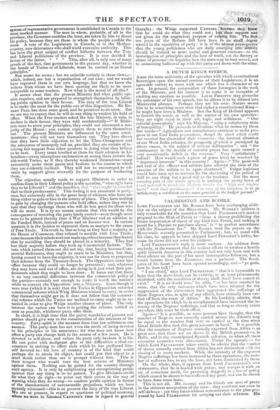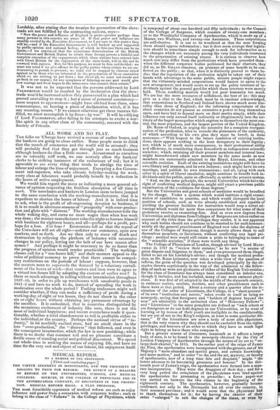PALMERSTON AND SCOBLE.
LORD PALMERSTON and Mr. SCOBLE have been exchanging civili- ties on the subject of the Slave-trade. Mr. Semmes address is only remarkable for the assertion that Lord PALMERSTON'S modest proposal to the Shah of Persia to "issue a decree prohibiting the future importation of slaves of any kind into Persia, and making it penal for a Persian to purchase slaves," is " in perfect accordance with the Mussulman law." Mr. SCOBLE read the papers on the Slave-trade recently presented to Parliament ; but, as usual with his class, he appears to have skipped Lord PONSONBY'S letter, be- cause its views did not serve his purpose.
Lord PALMERSTON'S reply is more curious. An address from anybody, at the moment that his zealous efforts to awaken a hostile spirit towards America in this country had not only been met with dead silence on the part of his most unscrupulous followers, but a round lecture from the Examiner, was a godsend. The flood- gates of his heart have been opened accordingly, and—" ye gods, how he does talk I "
" I am afraid," says Lord PALMERSTON, " that it is impossible to hope that the slave-trade can be entirely, or at least permanently abolished, until the condition of slavery shall itself have ceased to exist." " It is no doubt true," he adds, " as has been asserted by some, that the very measures which have been adopted for the suppression of the slave-trade have aggravated the sufferings of those Negroes who, in spite of our efforts, have annually been car- ried off from the coast of Africa." So his Lordship admits, that the operations for which he is complimented have increased the in- tensity of the Negroes' sufferings, and that so long as slavery exists anywhere this must be their effect.
Again—" It is possible, as some persons gave thought, that the number of Negroes now annually carried across the Atlantic may be equal to the number that were so carried at the time when Great Britain first took this great measure in hand." It is possible that the numbers of Negroes annually exported from Africa is as great now, that there are no slaves in the British possessions, in Haiti, and in the emancipated Spanish colonies, as when all these extensive countries were slave-marts. Under the operatictts for which Lord PALMERSTON takes credit, he admits that the number of slaves annually carried from Africa has not diminished with the closing of so many markets. While the intensity of the exported Negro's sufferings has been increased by these operations, the num- ber of sufferers has, to say the least, not been diminished by them. On the whole, then, it appears from Lord PALMERSTON s own statements, that he is lauded with praise, and accepts it with an air of conscious merit, for persisting doggedly in a line of policy which cannot be shown to have effected any good, and can be shown to have done some harm.
This is not all. Mr. SCOBLE and his friends are men of peace in the strictest acceptation of the term : they condemn war even in self-defence : yet they listen without remonstrance to the plan pro- posed by Lord PALMERSTON for carrying out their schemes. His Lordship, after stating that the treaties for prevention of the slave- trade are not fulfilled by the contracting nations, says- " Now the power and influence of England is great—greater perhaps than many persons in this country arc aware of. If that power and influence arc steadily exerted by the Executive Government, as I am sure in this matter they will be,—and if the Executive Government is well backed up and supported by public opinion and national feeling, of which in this case there can be no doubt,—I am convinced that the unanimous determination of the British Government and British Nation to obtain from foreign powers a faithful and complete execution of the engagements which those nations have entered into with Great Britain for the suppression of the slave-trade, will in the end be crowned with success. But, for this purpose, we must be firm anddecided: we must not mind if we give offence to the guilty parties whose crimes we are en- deavouring to punish or prevent; we must not be stopped by clamour raised against us by those who are interested in the perpetration of those enormities which we are striving to put down ; but above all, we must not recede and go back in our course ; for any symptoms of faltering on our part would give new courage and fresh hopes to the miscreants who commit these crimes."
It was not to be expected that the persons addressed by Lord PALMERSTON would be startled by the declaration that the slave- trade wou!cl be increased unless they persevered in a plan which had proved unavailing to stop it ; but a sense of personal consistency— mere respect to appearances—might have elicited from them, some remonstrance, on hearing a piece of declamation which, if it has any meaning, means, "If we cannot otherwise get these treaties ful- filled, we must accomplish it by force—by war." It will be edifying if Lord PALMERSTON, after failing in his attempts to excite a war- like spirit in any other class of the community, succeed with the Society of Friends.



























 Previous page
Previous page